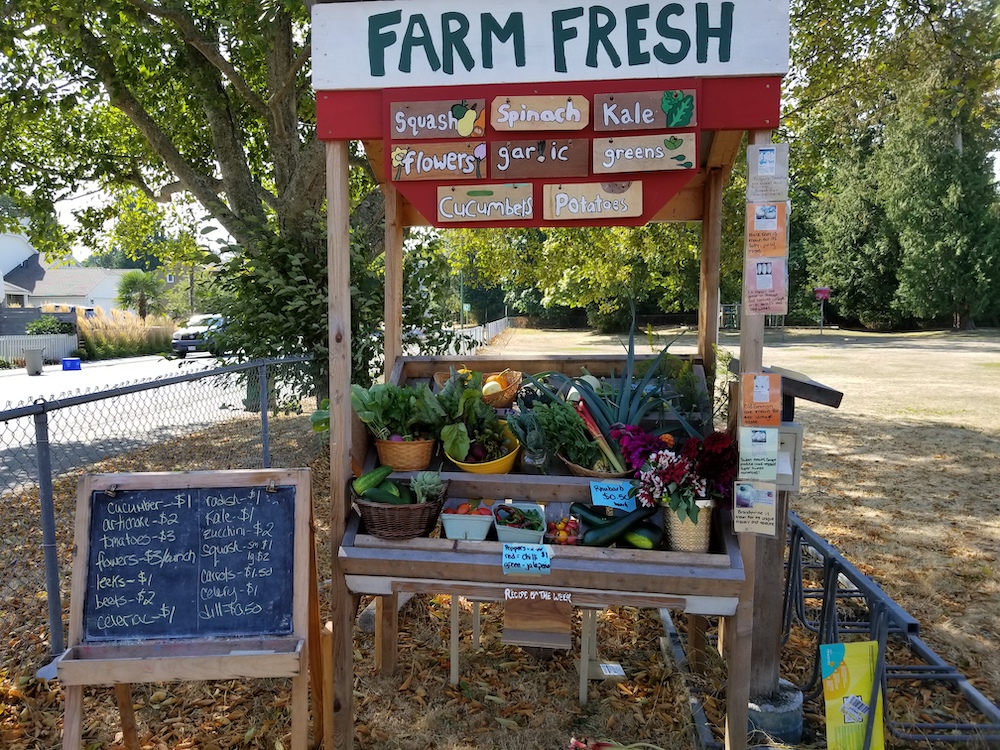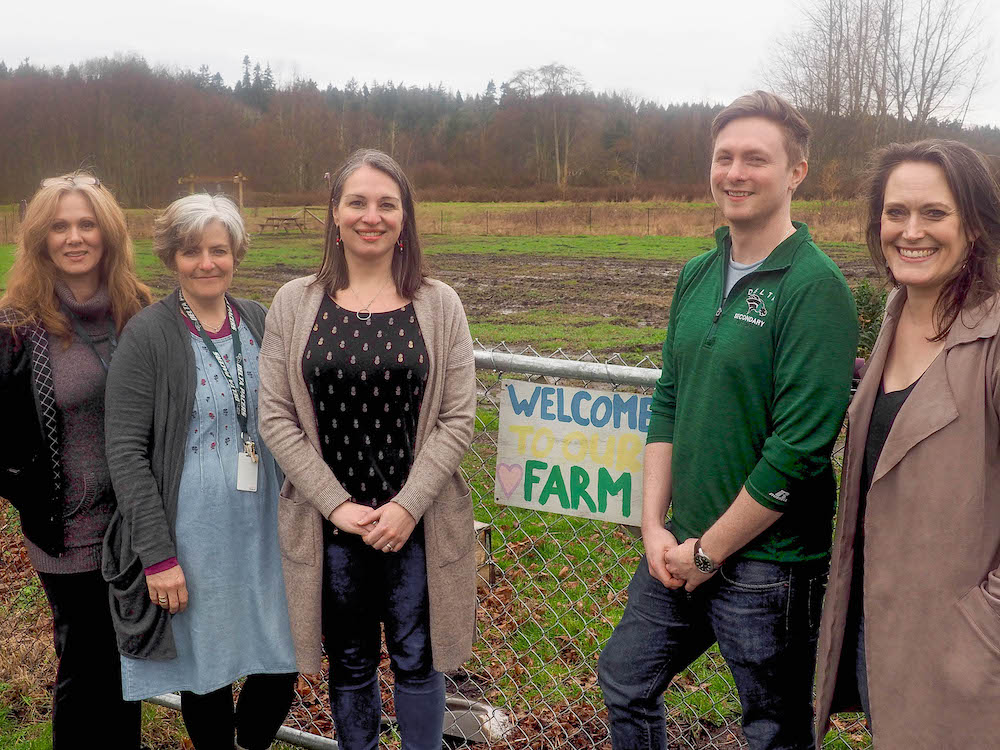The topic is farming, before it shifts abruptly to helicopters. Same topic, though.
In a classroom at the Farm Roots Mini School near Boundary Bay in Delta, guest speaker Mike Schneider is describing the problems of Okanagan cherry growers, including broken skins caused by excess moisture.
“So after a big June rain,” he says, “they will hire helicopters to come in and dry off the cherries with the blade wash.”
Add “helicopter pilot” to the list of farm-related occupations the students had just been looking at, a list that already includes marketer, logistics manager, food processor, graphic designer, even chef.
Soon Farm Roots teacher Cody Forbes is telling the students about chef Miguel Curiel of Tsawwassen restaurant Gracie’s. With a small kitchen and clientele, Gracie’s is well positioned to make use of good, fresh local produce, perhaps specialty items like poblano peppers.
Chef Curiel is hoping the Farm Roots class can grow the produce for him. They will be only too happy to oblige. Just outside the windows is a plot of land, currently home to a couple of desultory rows of kale and some winter pasture.
But it’s only March. Big things will be growing here soon, and the Farm School students will be growing them.
Four years ago, the Delta School Board opened the Farm Roots Mini-School, located in the former Boundary Bay Elementary School, as part of a larger plan to find new ways to educate, and new paths for students not being well served by traditional schooling models.
With so much emphasis on digital technology, farming might not seem like the most obvious area for a new high school program. But Paige Hansen, vice-principal for academies and choice learning in the Delta School District, thinks it is a good fit.
“These days a great deal of information is a Google search away,” she says. “So taking in factual information has perhaps become somewhat less important. It’s more about processes, figuring how to do things, make things happen. And that is the essence of farming.”
Most of the Farm Roots students alternate between the little Boundary Bay school building and more traditional Delta high schools, spending a day at each. The students are involved in bee keeping, grow apples and plums in a little orchard and plan and plant over 50 different crops in their small field.
There is a small stand at the edge of the property where their harvest is sold to locals (on the honour system). Baskets are also filled for the Community Supported Agriculture program — participants subscribe and receive a variety of fresh produce in return.

There are 26 kids in the program, drawn from Grades 10 to 12 in schools all over Delta. Today, close to 20 students are gathered in the Farm Roots classroom led by Forbes and teacher Bria Shantz.
The class has what an earlier generation might have described as a Breakfast Club vibe. Shantz runs the class with a relaxed, bend-but-don’t-break demeanour. Routine antics are tolerated but when one student blurts out a rude remark, Shantz quietly but firmly sends him out of the room.
The class is mostly attentive as Shantz and Forbes describe some options for this season’s crops, as well as the rationale behind the process of calculating yields.
“When someone like Chef Guriel is asking for produce,” Forbes tells the class, “you have to be able to tell him what you can provide. How many beets can you get out of a 100-foot row? It’s important to know. You have to do the math.”
For the most part the students seem to relish the Farm School experience.
“Once the kids get the experience of planting, growing, and harvesting, managing the whole process,” Hansen says, “they tend to want to come back.”
Grade 12 student Denzel Chand had been thinking about taking a culinary program before he found out about the Farm Mini School in Grade 11. His experience here changed his goals, so much so that he has now been admitted to Dalhousie University to study agribusiness.
“I realized agriculture is more interesting,” he says, “so I switched.”
The school may be less structured than most, but it’s all relative. For Grade 11 student Emmy Labossiere, this is the most traditional her educational experience gets.
“Aside from this I am taking chemistry online,” she says. “I prefer coming here.”
“I love bees,” says Grade 10 student Jensen Brown. “When I heard about the bees, I wanted to come here.”
Educational assistants Claire Forester and Dawn-Marie Selman are part of the small staff that helps co-ordinate the operation and look after some indoor growing. There are shelves of little pots selected with an emphasis on bee-friendly crops — spinach, summer savoury, basil, French thyme, lavandula, echinacea, artichokes, leeks, onions and kale, all nursed along under grow lamps in a former classroom.
It’s an awkward fact that the school year does not jibe perfectly with the growing season — somebody has to keep things growing after the school year ends. Farm Mini School crops are nurtured over the summer months by Fresh Roots, a non-profit Vancouver organization that focuses on agriculture in education.
University interns from Fresh Roots, along with a Delta high school teacher, lead Delta students who maintain the farm in exchange for an English credit. The Farm Roots class is back in plenty of time for fall harvesting.
The curriculum strives to educate kids about the wider food economy and all its many layers. Schneider, today’s guest speaker, runs a program called Project Pickle that attempts to show Delta elementary school students the entire process of planting and growing cucumbers, pickling them and taking them to market.
He brings a bowl of fresh radishes and peas for the class to sample and soon the students are munching radishes like they were Jolly Ranchers. Hansen has noticed a similar palate-broadening effect with any number of unusual items.
“If they plant it,” she says, “they’ll eat it.”
Schneider’s guest presentation contains some sobering facts, among them that the current number one agricultural commodity in B.C. is farmed salmon. “I expect cannabis to be soaring into the top five very soon,” he tells the class.
Schneider brings out another unsettling statistic: 58 per cent of B.C. farmers, he says, are 55 years of age or older. The 20-odd students in this classroom may not be enough to make a significant impact on that statistic. But they can’t hurt.
And whether or not they eventually choose to pursue agriculture-related careers, this modest little plot of Tsawwassen school land is likely to make a lasting impression.
“We love our bad puns here,” Hansen says. “Planting seeds. Cultivating minds. That sort of thing.”
“At the Farm School you feel like you are making a visible difference,” says Jensen Brown. “It’s not just working through a couple of pages of an assignment.”
Class is out. The students pile out into the hallway, and one young man is soon strolling down the hall strumming a guitar. Denzel Chand, future Dalhousie student, looks around the little repurposed elementary school building.
“It’s a unique experience,” he says. “A lot different from a normal high school. I like it here.”
It’s too early in the season for the bees — this winter was a bad one for the school’s hives, and it seems the colonies will need to be rebuilt this season. Nothing is really growing yet. That’s still to come.
Soon, like any high school anywhere, the halls are quiet again. ![]()
















Tyee Commenting Guidelines
Comments that violate guidelines risk being deleted, and violations may result in a temporary or permanent user ban. Maintain the spirit of good conversation to stay in the discussion.
*Please note The Tyee is not a forum for spreading misinformation about COVID-19, denying its existence or minimizing its risk to public health.
Do:
Do not: